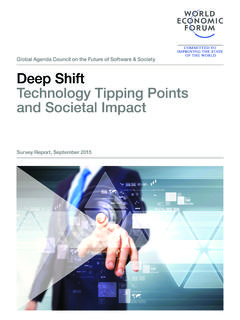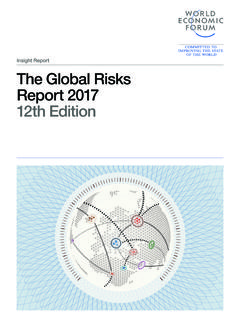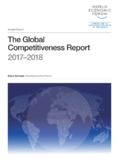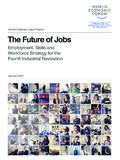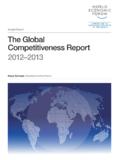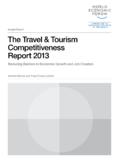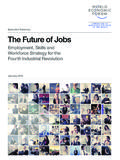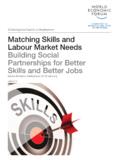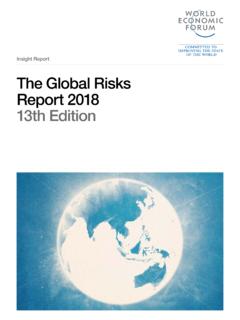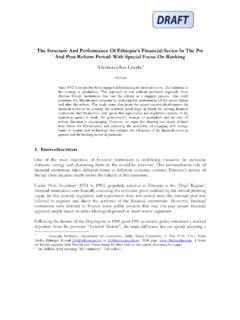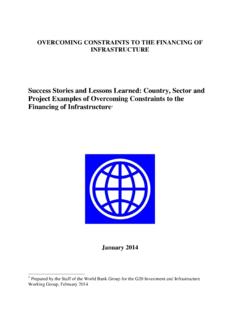Transcription of Global Agenda Council on the Future of Financing & …
1 Global Agenda Council on the Future of Financing & CapitalThe Future of FinTech A paradigm Shift in Small Business FinanceOctober 2015 WORLD ECONOMIC FORUM, 2015 All rights part of this publication may be reproduced ortransmitted in any form or by any means, includingphotocopying and recording, or by any informationstorage and retrieval 1310153A paradigm Shift in Small Business FinanceContentsForeword3 Foreword5 Acknowledgements7 Executive Summary8 Small Business Finance Is a Global Issue Worth Addressing10 The Opportunity: FinTech as a Game Changer for SME Finance12 a.
2 Marketplace (peer-to-peer) lending17 b. Merchant and e-commerce finance20 c. Invoice finance21 d. Supply chain finance24 e. Trade finance26 The New Role of Public Institutions National and International30 4. Conclusion: FinTech Can Change Small Business Finance in a Significant and Sustainable Way31 References34 About the Authors35 EndnotesSmall and medium sized enterprises (SMEs) are often cited as the major driver of economies and a force in job creation, but they still have difficulty securing proper Financing to Global financial crisis of 2007-2008, coupled with higher regulation and capital costs for loans to SMEs, has made it even more difficult for SMEs to secure Financing .
3 However, the financial crisis has also created a plethora of disruptors in the FinTech area ( FinTech , a contraction of finance and technology , is defined as the use of technology and innovative business models in financial services) who, with their innovative ways to originate, assess credit risk and fund SME loans, have provided alternative ways for SMEs to secure funding for their the last year, the Global Agenda Council on the Future of Financing & Capital, formed of industry leaders, academics, finance ministers and central bankers, has tackled the question of the lack of Financing for SMEs, although ample cash is ready to be deployed.
4 This report synthesizes the authors efforts to take stock of what the finance industry has provided to date and how the FinTech industry has taken over some of the funding with its innovative business models and behalf of the World Economic Forum and the Global Agenda Council on the Future of Financing & Capital, we wish to thank all who have contributed their time and expertise to this report, particularly Arnaud Ventura and Peter Tufano, who led this work stream, and Daniel Drummer, who led the research and editing of this work. We hope the report proves to be insightful and a helpful reference in your quest to understand how disruptors in the FinTech industry are providing alternative ways of funding for KoenitzerProject ManagerPromoting Global Financial InclusionGlobal Agenda Council on the Future of Financing & CapitalWorld Economic ForumGiancarlo BrunoHead of Financial Services IndustryWorld Economic Forum4 The Future of FinTechInnovation tends to challenge and sometimes displace traditional sectors and practices.
5 The printing press, internal combustion engine, and computer are all examples of technological innovations that transformed societies and economies. In the last 15 years and with the creation of a connected world, tech-led innovations are challenging established industries. For example, structural upheaval is happening in sectors such as hospitality or transport with players such as Airbnb and the last three decades of financial innovation have already led to massive changes in financial services, we believe that a new wave of innovation will continue to transform the industry.
6 Innovation, through what has been called FinTech, is already disrupting the ways financial services are being offered, promising to provide access to underserved markets in new ways. Considering the importance of small and medium sized enterprises and their need for funding we focus on this particular aspect of FinTech in this report. We hope that innovations in this field and others in payments, wealth management and elsewhere will make a lasting contribution to the creation of a better and more stable SteinDirectorWorld Bank GroupArnaud VenturaCo-founder Positive Planet FoundationFounder & CEO Microcred GroupPeter TufanoDean, Sa d Business SchoolUniversity of Oxford5A paradigm Shift in Small Business FinanceAcknowledgementsThis report has been supervised by the Global Agenda Council on the Future of Financing & Capital, headed by Peer Stein.
7 Director in the Finance and Markets Global Practice of the World Bank Group. Council management was provided by Michael Koenitzer, Project Manager at the World Economic Forum. The report was produced in cooperation with Sa d Business School at the University of project was led by Arnaud Ventura (Co-Founder, Positive Planet Foundation and Founder and Chief Executive Officer, Microcred Group) and supported by the core group members Peter Tufano (Dean, Sa d Business School, University of Oxford), Tilman Ehrbeck (Partner, Omidyar Network), Matteo Stefanel (Founder and Managing Partner, Apis Partners), Njuguna Ndung u (Governor of the Central Bank of Kenya [2007-2015]) and Fran ois Robinet (Chairman, Axa Strategic Ventures).
8 The Future of FinTech study team was led by Daniel Drummer (Senior Consultant, McKinsey & Company), and the report was co-authored by Chahinaze Chalabi, Shailendra Sason and Bhanu Birla (all four holding a master s degree in business administration from Oxford Sa d).Academic support was provided by Oxford Sa d, its faculty and staff. Further research facilities were kindly provided by the Oxford Internet Institute and the University of thanks go to the Advisory Board, comprised of Janos Barberis, Arthur de Catheu, Kathleen Utecht, Alexander Prokhorov, John Donovan, Udayan Goyal, C dric Teissier, Arjan Schutte and Huy Nguyen special thanks goes to all participants who provided input, guidance and opinions in the course of creating this report, as depicted in Figure 1.
9 Interviews ConductedFigure 1 FinTech companies Investors Banks Ecosystem 6 The Future of FinTech7A paradigm Shift in Small Business FinanceExecutive SummarySmall and medium sized enterprises (SMEs) are a major, yet often overlooked driver of the world economy. They account for more than half of the world s gross domestic product (GDP) and employ almost two-thirds of the Global work , around the globe, SMEs often have one major pain point dealing with their finances and ensuring appropriate funding. As reported by the International Financial Corporation (IFC), a funding gap of more than $2 trillion exists for small businesses in emerging markets for this issue are manifold: the finances of SMEs are characterized by high complexity, yet are low scale.
10 For traditional lenders such as banks, extending credit to small businesses is often too costly, given the small loan size. Driven further by regulation, banks have reduced their exposure to smaller businesses in recent years. Internally, small businesses often lack the skills and resources to handle finance in a sophisticated manner and to conduct systematic fundraising. Acknowledging the importance of small businesses, governments, state agencies and international organizations have made many attempts to improve the situation. Measures include government guarantees, direct government lending, supporting SME banks or driving the implementation of credit bureaus.
